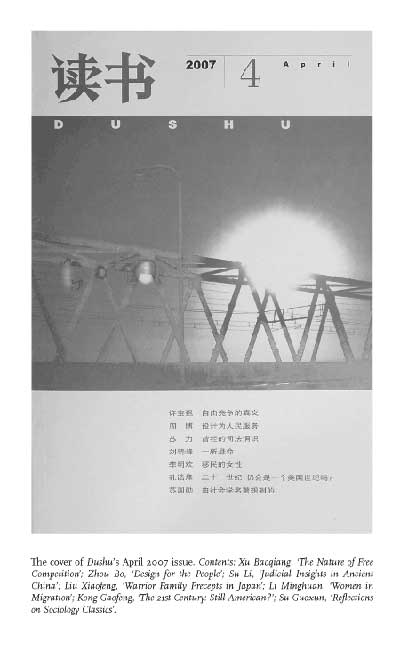NEW LEFT REVIEW publishes in its recent issue a longer essay by Zhang Yongle on the history of the important and influential intellectual Chinese magazine Dushu. Reason for the review is delivered by the current (July 2007) publication of a six-volume Chinese edition featuring the most important texts from 1996 to 2005, a time in which the magazine’s editors stepped up their criticism of the Communist Party’s economic liberalisation course, – and the recent removal of the two long-term chief editors during that period, Wang Hui and Huang Ping.
| In his article “No Forbidden Zone in Reading” Zhang Yongle provides a detailed history of the magazine. It reorientation in the 90s “reflected the dramatic ideological cleavage that has taken place within the intelligentsia from the mid-90s, when many of its authors began to articulate a critique of China’s development path. This was a highly controversial stance, soon dubbed ‘new left’ or ‘post-modernist’. Both labels had strong negative connotations in this context: for a long time after the 1970s, it was almost scandalous for an intellectual to be described as ‘left’ (as opposed to l’iberal’), because the majority of the intelligentsia had once been the victim of the (ultra-leftism of the Chinese Communist Party. Post-modernism seemed even stranger: how could an intellectual criticize the ideal of modernization in a backward society?” (citing signandsight) |
The dismissals provoked a storm of controversy among Chinese intellectuals: debate raged in cyberspace, newspapers and journals over the merits of the ‘Wang and Huang era’ of Dushu. The editors’ detractors argued that the two had turned the journal, ‘universally recognized’ by the Chinese intelligentsia in the 1980s and early 90s, into a platform for a small ‘new-left clique’, abandoned its elegant prose tradition and rendered it too specialized to be readable. Dushu’s supporters, however, argued that Wang and Huang’s editorial policy embodied precisely the sort of critical orientation that intellectuals should insist upon in an age of dramatic social transformation, when marketization and uneven development have created widening disparities in the midst of high-speed growth. This selection of the Essentials of Dushu allows readers to form their own assessments of the journal’s contribution to understanding and evaluating those processes. It offers an overview of Dushu’s intellectual preoccupations during the decade from 1996 to 2005, reflecting the major changes brought about under the joint editorship of Wang and Huang. For those outside China, it can also provide a good window on intellectual debates in the prc during this period: the journal provoked a great many discussions, exchanges and political polemics and, as its title suggests, this selection includes nearly all the essential pieces.
…. [] ….
But these changes do not heal the existing cleavage in the Chinese intelligentsia; this is, if anything, deepening. The form of Wang and Huang’s dismissal may seem to be non-political; but strictly speaking, it is a depoliticized political process. The technical pretext used by the sdx Publishing Company does not hold water. The true reason must lie elsewhere. Most intellectuals in China have no difficulty in figuring out the political implication of this sudden change. As a state-owned enterprise, sdx is affiliated to the China Publishing Group, which is further supervised by the Central Propaganda Department of the ccp. Bureaucrats have a strong incentive to tame this ‘trouble-making’ journal; for although Dushu’s style is very moderate, the ideas it spreads could potentially be dangerous, and neo-liberal intellectuals have long spoken ill of it. We may never know what was going on in the black box; but even before sdx made the announcement, liberal newspapers had spread the news that Dushu was to replace its chief editors, and some of its critics had already begun to celebrate their victory.
Unexpectedly, then, this six-volume collection marks the end of Dushu’s ‘Wang and Huang era’. What course the journal will now take remains to be seen. Initially, it seemed to stay on the same track for several months after Wang and Huang’s departure. More substantial changes look to have appeared with the January 2008 issue, which opens with a ‘Call for a Market Economy with the Rule of Law’. It seems unlikely that the previous editors would have used an official political slogan of this type as the title for an intellectual discussion. The Essentials of Dushu collection remains a window through which the world can see China’s social upheavals during this eventful decade, and situate the intelligentsia’s thinking within its historical context. The period has witnessed a dramatic reversal: the thinkers and writers once united by an aspiration for modernization are now divided by the bitter process of reform and development. In the face of these painful splits, some cannot help but look back to the unity of the 1980s for consolation. For these distracted minds, the past looks increasingly like a golden age. In an era of nostalgia, the Essentials of Dushu, 1996–2005 makes for sober reading: the ‘golden age’ is all the more irretrievably lost, for now even the myth that it was based on dissolves into the air. For China’s intellectuals, now is the time to stand on one’s own two feet and struggle bravely for recognition.
(link to entire article)

